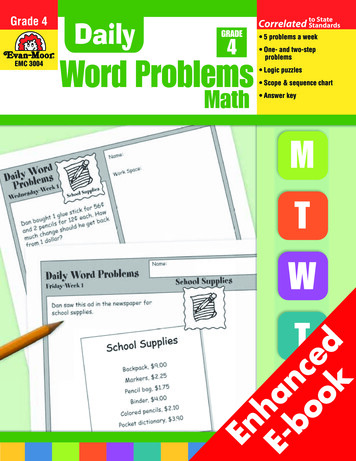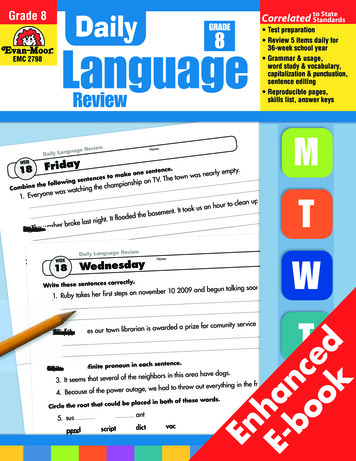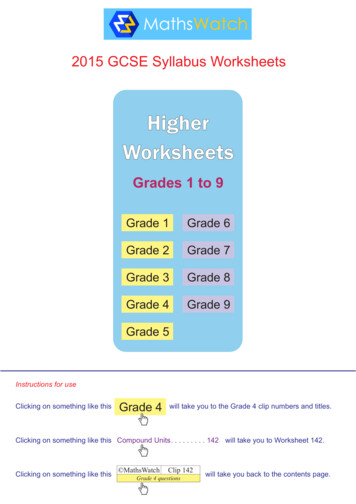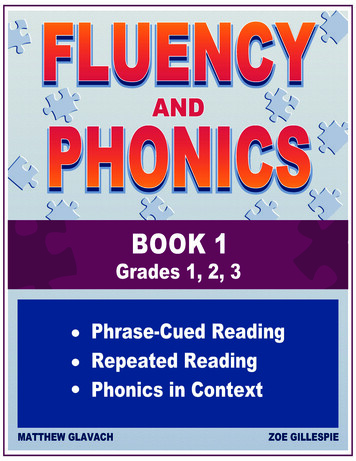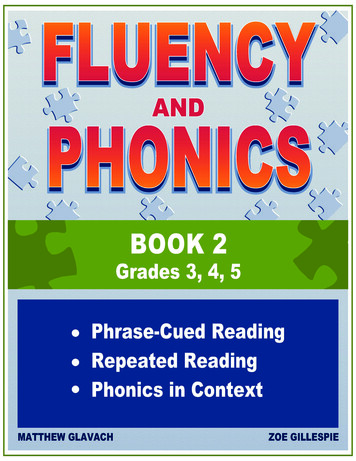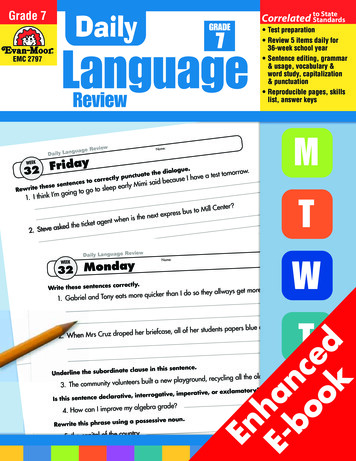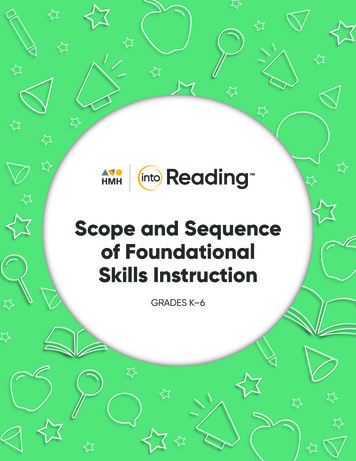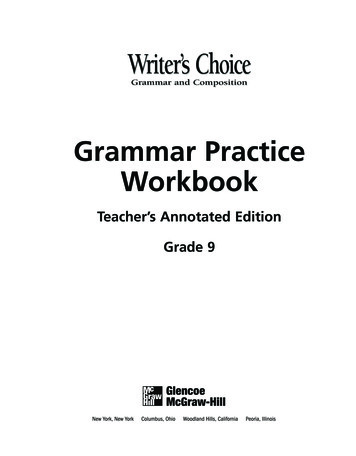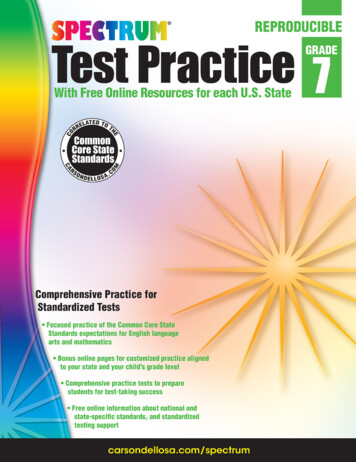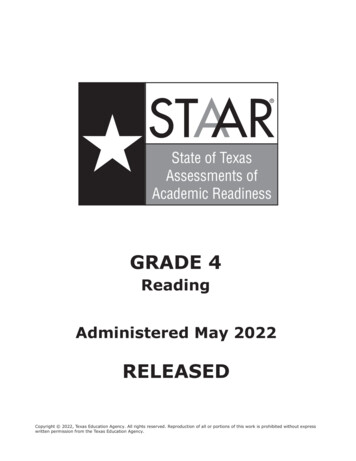
Transcription
STAAR State of TexasAssessments ofAcademic ReadinessGRADE 4ReadingAdministered May 2022RELEASEDCopyright 2022, Texas Education Agency. All rights reserved. Reproduction of all or portions of this work is prohibited without expresswritten permission from the Texas Education Agency.
READINGReadingPage 1
2326Read the selection and choose the best answer to each question.Then fill in the answer on your answer document.Digging Up the TruthCharactersNELSON: 4th-grade studentMATT: Nelson’s friendLUCIA: Nelson’s friendMS. CHEN: LibrarianMR. LUND: Nelson’s fatherSCENE 11[Late summer afternoon, outside the public library. Nelson and Mattwait for the bus.]2NELSON: What do you think of Writing Camp so far?3MATT: It’s pretty cool. What did you write about today?4NELSON: A guy who’s an astronaut. I had space travel on my mindfrom this great book I’m reading. . . . [Digs in his backpack to pullout his book.] Hold on. . . . [Digs some more.] Hey, I think I left mybook inside. I’ll be right back.5MATT: Hurry—the bus will be here soon.6[Nelson runs back into the library. Ms. Chen looks up when shehears the door.]7NELSON: Sorry to bother you, but I think I left something in here.8MS. CHEN: Feel free to look around, Nelson. What are youmissing?9NELSON: It’s a book called Space Ride. [Searches the area wherehe sat earlier.] Have you seen it?10 MS. CHEN: No, but I’ll help you look.11 [Ms. Chen and Nelson search for a few minutes but don’t find thebook.]12 MS. CHEN: Let’s look again tomorrow morning. Maybe it will turnup.ReadingPage 2
13 NELSON: [Disappointed.] I hope so. Thanks, Ms. Chen.14 [Nelson hurries out to the bus stop.]SCENE 215 [The next morning. Matt and Nelson are walking into the librarybefore camp.]16 MATT: Did you ever find your book?17 NELSON: [Sighs.] No. And I was just getting to the good part.18 MATT: What’s it called?19 NELSON: Space Ride. Will you help me look?20 MATT: Sure.21[The boys check all around but find nothing. They are walking totheir seats, but Matt abruptly stops.]22 MATT: Hey, Nelson, look at that. [Nods his head toward Lucia, whois reading Space Ride at the next table.]23 NELSON: [Irritated.] Let’s go talk to her.24 [The two boys walk over to Lucia.]25 NELSON: Hi, Lucia. Where’d you get that book?26 LUCIA: [Looking up.] At the bookstore. Why?27 NELSON: I lost my copy yesterday. Are you sure you didn’t find ithere?28 LUCIA: [Shakes her head.] No, this one’s mine.29[Nelson looks at Lucia suspiciously.]30 LUCIA: [Closing the book and holding it to her chest.] You’re notthe only person who likes this book, Nelson. Besides, I’m onpage 134. If I had just found the book, I couldn’t have read thismany pages already.31 [Ms. Chen overhears the students talking and walks over to them.]32 MS. CHEN: Nelson, there’s no reason to assume that Lucia hasyour book.ReadingPage 3
33 NELSON: But Ms. Chen, I lost this same book yesterday, and todayLucia is reading it. Don’t you think that’s strange?34 MS. CHEN: No, and we should trust Lucia. This book is verypopular. The library even has a waiting list for it. You can keeplooking for your book after camp. Now please have a seat so we canstart writing.35 [Nelson and Matt slowly walk back to their table. Nelson looksdistressed.]SCENE 336 [Later that evening. Nelson and Mr. Lund are sitting on the couch intheir living room.]37 NELSON: [Forcefully.] Dad, I just know Lucia has my book.38 MR. LUND: Lucia said that was her copy, Nelson. Are you sureyou’ve looked everywhere?39 NELSON: I’ve searched the library a hundred times.40 MR. LUND: How about your room? And in your backpack?41 NELSON: [Shaking his head.] It’s not in there, Dad.42 MR. LUND: Why don’t you look in your bag one more time? I’llhunt around here.43 [Nelson opens his backpack and takes out all his belongings, one byone. He turns the backpack upside down and shakes it. A book fallsout.]44 NELSON: [Shocked.] Dad, the book was in my bag the whole time.Look, here. [Shows Mr. Lund the inside of his backpack.] The insidepocket is torn, and it must’ve slipped down into the lining of thebag. [Sticks his hand in the backpack. Smiles. Then looksconcerned.] Poor Lucia was telling the truth all along. And Ms. Chen.She tried to help me.45 MR. LUND: Well, tomorrow is a new day.46 NELSON: You’re right. I’ll show the backpack to Lucia andMs. Chen when I get to the library in the morning. I hope they’llunderstand and accept my apology.47 MR. LUND: [Nodding his head.] That’s a good plan.ReadingPage 4
48 NELSON: But now I have another plan.49 [Nelson smiles and makes himself comfortable on the couch andopens up Space Ride.]ReadingPage 5
142308 2Read line 25.NELSON: Hi, Lucia. Where’d you get that book?What is the most likely reason Nelson asks Lucia this question?A To learn where he can buy the same bookB To find out if she picked up his book in the libraryC To get suggestions from her about where to look for his bookD To see if there is another copy of the book in the library242310 4What does the word assume mean in line 32?F Suggest a different solutionG Realize something is missingH Wonder about a problemJ Believe something without proof342890 3Which line from the play best supports the idea that Nelson realizeshe made a mistake?A NELSON: Are you sure you didn’t find it here? (line 27)B NELSON: Don’t you think that’s strange? (line 33)C NELSON: Poor Lucia was telling the truth all along. (line 44)D NELSON: But now I have another plan. (line 48)ReadingPage 6
442309 1Read line 45.MR. LUND: Well, tomorrow is a new day.What does this line suggest?F Nelson can improve the situation with Lucia and Ms. Chen.G Lucia will notice that Nelson is being nice to her.H Mr. Lund will help Nelson look for a new backpack.J Nelson should return to writing camp with Matt.542311 2Why is Mr. Lund important to the resolution of the play?A He listens to Nelson talk about his problem.B He tells Nelson to look through his backpack again.C He looks through the house to find the book.D He offers a way to apologize the next day at camp.ReadingPage 7
642307 3Read the dictionary entry.check \ˈchek\ verb1. to mark2. to control3. to search4. to studyWhich definition of check is used in line 21?F Definition 1G Definition 2H Definition 3J Definition 4742891 4Read this stage direction from line 30.LUCIA: [Closing the book and holding it to herchest.]What does this stage direction suggest about Lucia?A She wants to be sure to take the book when she leaves.B She wants to read the book before Nelson does.C She is upset that Nelson plans to write about the book.D She realizes that Nelson thinks the book belongs to him.ReadingPage 8
2314Read the selection and choose the best answer to each question.Then fill in the answer on your answer document.Junior Park RangersIt’s a warm, sunny day at Garner State Park in Texas. A group ofchildren crouch down near a dusty trail. The children are studying astrange set of footprints on the ground. One girl points at the toemarkings. Meanwhile, a boy studies an animal-tracking guide. “Ithink they belong to a turkey!” the boy announces. The otherchildren agree. They make a note in their journals. “We’re one stepcloser to our Junior Ranger badges!” the girl grins. These childrenare participating in the Texas State Parks Junior Ranger Program.This program offers a fun way for children to discover and explore inTexas state parks.Children wearing Junior Ranger ExplorerPacks stop along a trail to studyanimal tracks.Courtesy of Texas Parks and Wildlife1Junior Rangers across Texas2In May 2013 the Texas State Parks Junior Ranger Program began.Thanks to the program, there are many Junior Rangers across thestate of Texas today. This means that many children have learnedhow to take care of parks. This is good news for Texas state parksbecause there are nearly 100 parks in the state.3No matter where you live in Texas, chances are there is a state parkclose to you. There are park locations among mountains andcanyons, in the desert, and along the seashore. Each park is richwith different animals, birds, rocks, flowers, and plants. No twoReadingPage 9
parks are alike. Each park offers a unique experience for youngexplorers.Becoming a Junior RangerIt is easy to become a Junior Ranger. The program is completelyfree and is available to children aged 6 through 12. Childreninterested in becoming a Junior Ranger need the Junior RangerActivity Journal. This journal is available at every state park. Thejournal describes the park and its history. Children can also readabout the jobs of park rangers in the journal. It contains safety rulesas well as information about how to keep the park beautiful.Children enjoy afamily hike as theyuse the JuniorRanger ExplorerPack that theyborrowed from thepark headquarters.Courtesy of Texas Parks and Wildlife45In order to become a Junior Ranger, you must complete some of theactivities in the journal. The number of activities is determined byyour age. For example, if you are 8 to 10 years old, you may workon your choice of seven activities. You may choose to interview aranger, explore a trail, complete a game, or answer questions aboutthe park. If you are younger, you may complete fewer activities. Ifyou are older, more activities are required to earn your badge.6No matter your age, when you have finished your activities, a parkranger will review the completed activities in your journal. (You maytake the journal home as a souvenir!) Then, you will take the JuniorRanger pledge and promise to care for the park. You will also receiveReadingPage 10
an official Junior Ranger badge. Each park has a different badge, soyou can collect as many as you want!Helpful Tools for Junior RangersEach time you visit a new Texas state park, visit the parkheadquarters. It is often located near the park’s main entrance. Thisis where you can pick up a Junior Ranger Activity Journal. Somestate parks offer Junior Ranger Explorer Packs. Children may borrowthe backpack from the park headquarters.Tools in a Junior Ranger Explorer Pack8Courtesy of Texas Parks and Wildlife7The Junior Ranger Explorer Packs contain helpful items for a youngexplorer. The backpacks include binoculars, a magnifying glass, ananimal-tracking key, a pencil, crayons, watercolors, and asketchbook. The binoculars are especially useful for viewing animalsfrom a distance. The animal-tracking key shows what differentanimal tracks look like. The key helps explorers figure out whichanimals have traveled on a path by looking at their footprints. Thebackpack also includes guides to birds, flowers, rocks, plants, andtrees. The guides help children learn more about what can be seenat the state park.Spoken Like a Real Junior Ranger9ReadingWhat’s it like to earn a Junior Ranger badge? “It’s fun!” says MollyMiser, who earned a badge at Stephen F. Austin Park.Ranger Bryan Hein, who awarded her the badge, agrees. “It’s agreat opportunity for our young ones to learn the culture andnatural resources of our parks,” he says.Page 11
842244 1What is the central idea of the selection?F The Junior Ranger Program offers a way for children to learnabout and explore Texas state parks.G Children can meet Junior Rangers by visiting Texas state parks.H Children who live near a Texas state park can become JuniorRangers.J The Junior Ranger Program activity books give childrensomething to do when they visit Texas state parks.942245 2In which section would the reader find information about having apark ranger review the Junior Ranger Activity Journal after theactivities in the journal have been completed?A Junior Rangers across TexasB Becoming a Junior RangerC Helpful Tools for Junior RangersD Spoken Like a Real Junior Ranger42248 410 Which sentence best states a message in the selection?F Spending time outdoors is a good way to make new friends.G The most difficult activities are usually the most interestingones.H It is important for children to make their own goals.J Learning about nature can be challenging and rewarding.ReadingPage 12
42240 111 In paragraphs 4 through 6, what key idea about the Junior RangerActivity Journal is best supported?A It includes activities students must complete to earn a badge.B It describes activities students have done to improve the park.C It teaches students about the different state parks in Texas.D It gives students a place to write about their experience.42250 412 What is the most likely reason the author includes the anecdote inparagraph 1?F To explain what a child must do to become a Junior RangerG To persuade children to use a Junior Ranger Explorer Pack at aparkH To provide details about activities available at Texas state parksJ To introduce the topic by describing a real Junior Rangerexperience42241 313 Which sentence best explains why children should visit as manyparks as they can?A This program offers a fun way for children to discover andexplore in Texas state parks. (paragraph 1)B This is good news for Texas state parks because there are nearly100 parks in the state. (paragraph 2)C Each park offers a unique experience for young explorers.(paragraph 3)D This journal is available at every state park. (paragraph 4)ReadingPage 13
4638Read the next two selections and choose the best answer to eachquestion. Then fill in the answer on your answer document.Do What You Can1There was once a farmer who had a large field of corn that heharrowed and weeded with the greatest care, for he wanted to sellthe corn and buy good things for his family with the money. Butafter he had worked hard, he saw the corn wither and droop, for norain fell, and he began to fear that he was to have no crop. He feltvery sad, and every morning he went out to the field and looked atthe thirsty stalks and wished for the rain to fall.2One day, as he stood looking up at the sky, two little raindrops sawhim, and one said to the other: “Look at that farmer. I feel verysorry for him. He took such pains with his field of corn, and now it isdrying up. I wish I might help him.”3“Yes,” said the other, “but you are only a little raindrop. What canyou do? You can’t wet even one hill.”4“Well,” said the first, “I know, to be sure, I cannot do much; butperhaps I can cheer the farmer a little, and I am going to do mybest by going to the field to show my good will, if I can’t doanything more. Here I go!”5The first raindrop had no sooner started for the field than thesecond one said:ReadingPage 14
6“Well, if you really insist upon going, I think I will go, too. Here Icome!” And down went the raindrops. One came—pat—on thefarmer’s nose, and one fell on a thirsty stalk of corn.7“Dear me,” said the farmer, “what’s that? A raindrop! Where did itcome from? I do believe we shall have a shower.”8By this time a great many raindrops had come together to see whatall the commotion was about, and when they saw the two kind littledrops going down to cheer the farmer and water his corn, one said:9“If you two are going on such a good errand, I’ll go, too!” And downhe came. “And I!” said another. “And I!” And so said they all, until awhole shower came and the corn was watered, and then the corngrew and ripened—all because one little raindrop tried to do what itcould.Public DomainHow Six Sons Rescued AnansiAn Adaptation of an African Folktale1 Many years ago a spider named Anansi had six sons. Each one hada special talent, so Anansi gave each son a name that identified thatson’s unique gift. Anansi called his sons: River Drinker, See Far,Stone Thrower, Road Builder, Bubble Blower, and Puffy Pillow.2 One morning Anansi told his sons, “There’s a treasure that glowsbehind the mountain. I am going to search for it.”3 “Good luck, Father,” the six sons said.4 That evening See Far was peering into the distance from a tall tree.Suddenly he shouted to his brothers, “Father has fallen into a lake,and a fish has swallowed him! He needs our help.”5 Instantly Road Builder built a silky trail that zigzagged like alightning bolt through the trees. Then, the brothers charged downthe path to the lakeshore.6 “But how will we capture the fish?” cried See Far. “It’s hidingbeneath the waves.”7 “That’s no problem,” announced River Drinker. He leaned over andgulped down the water. Soon the fish was flapping on the dry, sandybottom.ReadingPage 15
8“But how will we get Father out?” asked See Far. “He’s trappedinside.”9“Watch me!” declared Bubble Blower. He took a deep breath andblew into the fish. Seconds later a huge bubble floated out withAnansi screaming for help inside it!10 However, before the six sons could catch the bubble, it floated intothe sky.11 “Oh, no!” gasped See Far. “Father and the bubble have drifted intothat thundercloud.”12 “I’ll rescue him,” proclaimed Stone Thrower. Carefully he aimed atiny pebble at the thundercloud and then threw the rock into thecloud. Pop! Anansi plunged from the sky back toward the earth.13 “Father is falling!” yelled See Far frantically.14 “Oh, no!” said Puffy Pillow. In a flash, he lay beneath Anansi.15 Plop! Anansi landed with a gentle bounce on Puffy Pillow’s soft,springy back.16 “Thank you, my talented sons,” Anansi praised. “I wish I couldreward you all with the treasure I discovered, but I only found oneglowing white ball. How will I decide which son deserves it most?”17 As Anansi considered his dilemma, he began to smile. Finally, withone tremendous toss, he hurled the ball into the darkening nightsky.18 “Look, my sons,” Anansi laughed with delight. “I’ve placed the moonin the sky so you can share the reward.”ReadingPage 16
42087 414 Use “Do What You Can” to answer the following question.Which sentence from the story “Do What You Can” supports theidea that the first raindrop inspires the other raindrops?F “I feel very sorry for him.” (paragraph 2)G “I wish I might help him.” (paragraph 2)H “Yes,” said the other, “but you are only a little raindrop.”(paragraph 3)J “Well, if you really insist upon going, I think I will go, too.”(paragraph 6)42086 415 Use “Do What You Can” to answer the following question.What does the word wither mean in paragraph 1 of the story“Do What You Can”?A Find warmthB Grow fastC Stay strongD Become dryReadingPage 17
41759 116 Use “Do What You Can” to answer the following question.In the story “Do What You Can,” which key idea about the firstraindrop do the details in paragraph 2 support?F The first raindrop understands the farmer’s problem.G The first raindrop wants to be the farmer’s friend.H The first raindrop believes the farmer should plant a differentcrop.J The first raindrop thinks that hard work has made the farmer ill.41768 317 Use “How Six Sons Rescued Anansi” to answer the followingquestion.Based on the events throughout the story “How Six Sons RescuedAnansi,” which sentence best describes how Anansi feels about hissons?A He is bothered by their unusual behaviors.B He is eager to teach them new skills.C He is proud of their accomplishments.D He is upset by their attitudes.ReadingPage 18
41770 218 Use “How Six Sons Rescued Anansi” to answer the followingquestion.Look at this illustration from the story “How Six Sons RescuedAnansi.”What is the most likely reason the author includes this illustration?F To highlight that Anansi is about to escape from the bubbleG To show that Anansi is floating high in the bubbleH To hint that Anansi is worried that the hungry fish may eat himJ To suggest that no one can see where Anansi has goneReadingPage 19
41769 319 Use “How Six Sons Rescued Anansi” to answer the followingquestion.What is the main message of the story “How Six Sons RescuedAnansi”?A Everyone makes mistakes sometimes.B Doing your best is more important than succeeding.C More can be accomplished when working as a team thanworking alone.D The world has many wonders that are waiting to be discovered.41519 420 Use “How Six Sons Rescued Anansi” to answer the followingquestion.Which sentence from the story “How Six Sons Rescued Anansi”best helps the reader understand that Anansi’s problem isresolved?F Seconds later a huge bubble floated out with Anansi screamingfor help inside it! (paragraph 9)G “I’ll rescue him,” proclaimed Stone Thrower. (paragraph 12)H Anansi plunged from the sky back toward the earth.(paragraph 12)J Anansi landed with a gentle bounce on Puffy Pillow’s soft,springy back. (paragraph 15)ReadingPage 20
41515 221 Use “Do What You Can” and “How Six Sons Rescued Anansi” toanswer the following question.Which sentence best describes a SIMILARITY between the stories“Do What You Can” and “How Six Sons Rescued Anansi”?A Both stories include a family who spends time together.B Both stories include characters who are rewarded for theirefforts.C Both stories have characters who go on dangerous journeys.D Both stories use humor to send a message.43021 122 Use “Do What You Can” and “How Six Sons Rescued Anansi” toanswer the following question.How do the raindrops in the story “Do What You Can” DIFFERfrom the sons in the story “How Six Sons Rescued Anansi”?F The raindrops do not have different abilities, but the sons do.G The raindrops do not listen to one another, but the sons do.H The raindrops do not spend time together, but the sons do.J The raindrops do not like one another, but the sons do.ReadingPage 21
41514 423 Use “Do What You Can” and “How Six Sons Rescued Anansi” toanswer the following question.What is one way the farmer’s experience in the story “Do What YouCan” is DIFFERENT from Anansi’s experience in the story “HowSix Sons Rescued Anansi”?A The farmer changes by the end of the story, but Anansi does notchange.B The farmer learns a lesson, while Anansi teaches a lesson.C The farmer’s feelings about his situation stay the same, butAnansi’s feelings about his situation improve.D The farmer’s problem is caused by nature, while Anansi’sproblem is caused by an accident.43110 424 Use “Do What You Can” and “How Six Sons Rescued Anansi” toanswer the following question.What causes BOTH the raindrops in the story “Do What You Can”and the sons in the story “How Six Sons Rescued Anansi” to takeaction?F They hope to receive a prize.G They are looking for adventure.H They are asked to do something.J They realize someone needs help.ReadingPage 22
2325 Grade4 ReadingRead the selection and choose the best answer to each question.Then fill in the answer on your answer document.A young girlenjoys listeningto music.1 iStock.com/hidesyMake More Time for MusicAre you one of those people who loves listening to music? Do youlisten to it whenever you can? If so, you’re doing something goodfor your mind and body. If not, you should think about adding moremusic to your life. It just might make you happier, healthier, andbetter rested. It could even make you a better student.Music and Your Mood2Music can make you smile, sing along, or get up and dance. Theseexperiences are proof of music’s power. In fact, scientists believethat music makes people happier. Valorie N. Salimpoor at McGillUniversity has studied music and the human brain. She has proventhat listening to pleasant music causes positive changes in the brain.These changes create feelings of excitement, joy, and pleasure. Andthose feelings make a person happy.3Two teams of researchers in Germany and Hungary have foundsomething similar. They’ve shown that listening to enjoyable musiccan boost a person’s mood. In other words, music can cheer you upwhen you’re feeling sad. However, providing amusement is notmusic’s only purpose. Music can also lower stress and help youworry less. That’s according to scientists at the Group HealthResearch Institute in Seattle, Washington. Their work has shownthat relaxing music can calm people who are stressed or worried.ReadingPage 23
Music Moves You4Music isn’t just good for your mind and mood, though. It’s also goodfor your body. For example, a study called “From Music-Beat toHeart-Beat” showed that music can be used to treat differentdiseases. Music can also lower blood pressure, which is good foryour health. What’s more, music gets the blood pumping when youexercise. A group of scientists from Spain and Brazil have studiedhow music affects runners. The scientists found that people runfaster and longer when they listen to music. Music can help you bikefaster too. British scientists studied bikers who listened to musicwith a fast beat. The faster the beat, the faster the bikers rode.Music Helps You Sleep5How else is music good for your health? It can help you get bettersleep. That’s according to a research study called “Music ImprovesSleep Quality in Students.” This study looked at college studentswho had a difficult time sleeping. Some of the students were told tolisten to relaxing classical music before bedtime. Those studentsslept better and even felt happier.Music for Your Brain6Still not convinced that listening to music is good for you? Then youmight be interested to learn that music can help you learn.Scientists in Finland, England, and the United States have shownthat music helps students. Listening to music can help you whenyou’re learning something new. It can also help you betterremember what you’ve learned. It can even help when you take atest, according to a British study. Students who listened tobackground music during a test answered more test questions. Theygot more of the answers correct too.7Music is more than just a pleasant art. It’s a powerful force that canmake our lives better. It can improve our mood, our health, andeven our grades. In short, it’s good for you. So make time formusic, and you won’t regret it!Third party trademark Group Health Research Institute was used in these testing materials.ReadingPage 24
42300 325 What is the most likely reason the author wrote this selection?A To describe the best places for people to listen to musicB To show why athletes should listen to more musicC To explain that music is more powerful than many people realizeD To suggest that music is the best way to fix bad habits42296 126 What can the reader infer about the results of the research studydescribed in paragraph 5?F A certain type of music encourages restful sleep for collegestudents.G Music helps college students understand the importance ofsleep.H College students are too busy to listen to music at night.J College students like classical music better than other kinds ofmusic.42304 227 What claim does the author make in the selection?A Teachers want their students to listen to music in class.B People should listen to music more regularly.C Students should avoid listening to music once they fall asleep.D Listening to music makes people want to exercise.ReadingPage 25
42306 428 Based on the information throughout the selection, what can thereader conclude about students who listen to music during a test?F Students will likely fall asleep during a test if there is musicplaying.G Students will get their blood pumping if they listen to musicduring a test.H Students will be less bored if they are able to listen to musicduring a test.J Students will feel calmer during a test if there is music playing.42303 129 What is the best summary of the selection?A There are many reasons why people should listen to music.Studies show that music can improve your mood. Music is alsogood for the mind and body.B Many people enjoy listening to music. It helps them feel lessworried. In fact, one study showed that listening to music beforebed can make people happier.C Not everyone chooses to listen to music. However, some peoplelisten to music because it helps them learn. Music is also goodfor people who have trouble sleeping.D Music is able to help people become healthier. In addition, musichelps people when they are trying to learn. Students who listento music during a test get better grades.ReadingPage 26
42298 2A young girlenjoys listeningto music. iStock.com/hidesy30 Look at this photograph from the selection.What is the most likely reason the author includes this photograph?F To show that some people like music with a fast beatG To show how some people respond to musicH To show that music can help people learnJ To show how music causes changes in the brain42305 131 The author uses a problem-and-solution organizational structure inthe section titled “Music Helps You Sleep” to help the readerunderstand —A that music allows people to feel more restedB why most college students do not get enough sleepC the steps to follow before going to sleepD how music is able to get students to relaxReadingPage 27
2274Read the selection and choose the best answer to eachquestion. Then fill in the answer on your answer document.Good Nightby Maxine W. KuminOf course there’s nothingin the nightthat isn’t there by day —except that sometimes5 by moonlightthe curtain has a wayof whispering to the shadeand shapes beginto bump and play10 as though two ghostshad things to sayand suddenlyI’m afraid.That’s not why I15 put on the light.I know just what you’ll say —of course there’s nothingin the nightthat isn’t there by day.20 The reason is,I think,my bed’s too cold,my bed’s too hot,I had a dream,25 I don’t know what,I needa little drink.ReadingPage 28
And once I seethat I’m all right,30 of course there’s nothingin the nightand that’s when Iput out the light.Used with permission.ReadingPage 29
42013 132 In line 12, the suffix -ly in the word suddenly helps the readerunderstand that suddenly means —F in a fast wayG without being fastH known for being fastJ a person who is fast42021 233 What is the most likely reason the poet includes the figurativelanguage in lines 6 and 7 of the poem?A To suggest that the speaker’s room is too quiet at nightB To emphasize what causes the speaker to imagine somethingC To describe objects that cannot be seen during the nightD To emphasize why the speaker’s room is too dark at night42019 234 Which line from the poem best explains the speaker’s problem?F that isn’t there by day — (line 3)G I’m afraid. (line 13)H I know just what you’ll say — (line 16)J The reason is
A book falls out.] 44 . NELSON: [Shocked.] Dad, the book was in my bag the whole time. Look, here. [Shows . Mr. Lund. the inside of his backpack.] The inside pocket is torn, and it must've slipped down into the lining of the bag. [Sticks his hand in the backpack. Smiles. Then looks concerned.] Poor Lucia was telling the truth all along. And .

